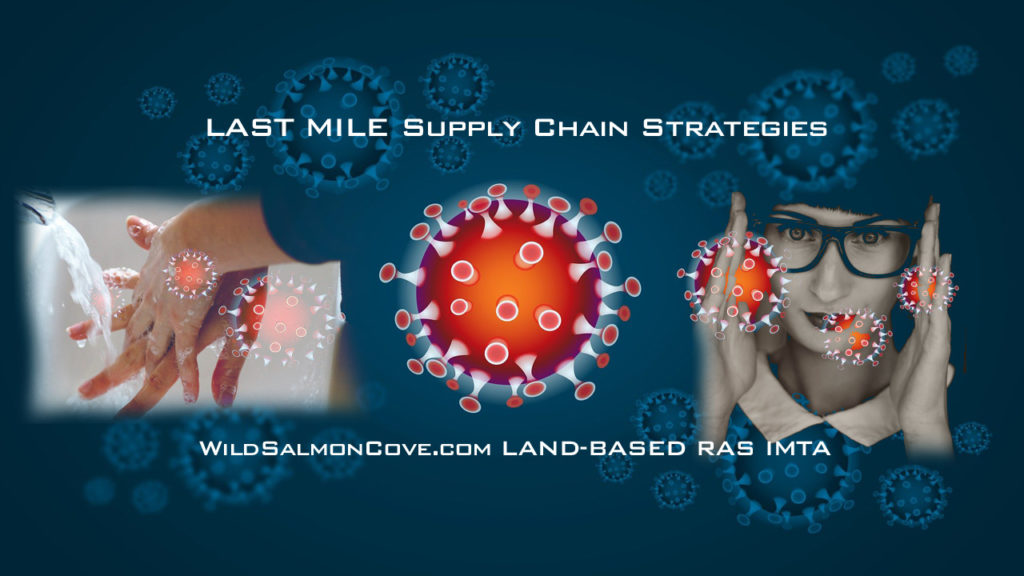I see it every day.
It’s worrisome,
but expected.

One of the most challenging parts of a journey for almost everyone in almost every venture, is the last mile, whether it’s about getting your fish to market fresh, or avoiding being infected with Covid-19.
Most of us do great out of the gate, but half-way through a long race many let down their guard, and all their hard work hits the wall!
Pacing yourself and paying careful attention to details defines winners, whether it is a seafood supply chain or Covid-19.
Regarding coronavirus, the general public has been thrown even further off balance because last month most of us thought this pesky virus would blow through in a couple of weeks and we’d all be back to normal in no time. We know now that two months plus is more realistic, and obviously more if we get hit like Italy. Bulldozing your way through this global pandemic is foolhardy and irresponsible.
Covid-19 is a life changer for all of us young and old, personally and in business.
Natural selection is going viral at warp speed.
It’s not the fittest who will survive though, it’s the one who is the most flexible and who can react the fastest to a constantly changing scenario. In the case of fisheries, it’s all about finding better solutions for overfishing and ocean pollution.
In the case of Covid-19 it’s about ramping up our health care infrastructure so it can handle overload in case we hit critical mass – we need more “last mile” ventilators to handle the burst.
Being flexible is of paramount importance.

Funny thing about viruses, you can do one hundred things right, but one small mistake can immediately place you at ground zero. There are no do-overs and “let’s try it again” scenarios that will UN-infect you.
Most of us are conscientious and following advice from scientists and political leaders. Unfortunately, there is a lot of info floating around making it hard to identify what is true, and what might be “deadly myth” masquerading as common sense.
For example, most people still don’t understand that the real danger is not that you touched the Covid-19 virus with your hand. It’s that you transferred the virus from your hand to an open part of your body, like your eyes, nose, or mouth.
Touching Covid-19 won’t harm you directly.
The last metaphoric mile to your nose however, is a different story.
If you’re curious about who is confused about Covid-19, all you have to do is look at the COMMENT sections in news media. People ask questions that by now everyone should know. For example, many still compare Covid-19 to measles. Granted, they are both viruses and close in appearance, but only until you get to the last mile. The measles virus is smaller physically than Covid-19, but both viruses when coughed or sneezed float in the air, albeit for different lengths of time. Air suspension means that when you step into an elevator, if someone who is Covid-19 positive sneezed in that confined space a few minutes earlier, the virus could still be floating in the air you breathe as you ride to your floor. It’s even possible that a person’s regular breathing, without a cough or sneeze, could infect you. Too many people are myopically focused on not touching elevator buttons with your finger, which is a good advice of course, but we also need to be concerned about what we breathe.
Confined spaces are one reason it’s dangerous to fly.
The measles virus is relatively small compared to Covid-19 that is made up of larger drops of vapor, or worse, mucus that spews out even when you talk normally. It can land within a meter or two radius. Covid-19 can live outside the body for hours or even days depending on the surface and ambient temperature. Fecal matter also carries great risk. Washroom taps and door handles at home or in public areas are serious danger zones.
The overarching challenge is that scientists still argue about how long measles and Covid-19 float in the air. Measles is a smaller airborne mass, consequently, it floats longer, up to half an hour on average, plus, because it is so small it more easily sticks to clothes. Cross-contamination is a bit different between the two viruses, but when you’re talking about a potentially fatal illness, are you going to argue whether the virus was airborne for ten minutes, or for half an hour? You have no idea if the last person who exited the elevator one minute before you coughed into the air that you’re now inhaling. You did everything great for the last two weeks, but at the last mile, you lose. What floor sir?
If you’re able, it’s safer to take the stairs simply because it has considerably more air volume, but again it depends on you or your stairwell. That’s where common sense comes into play. There often is no perfectly right answer. Lowering your odds is your best bet, but nothing is guaranteed.
Here’s another example; You obey all the rules that scientists and doctors are promoting, and you only go to the grocers when you truly need something … not because you’re out of ice cream. You shop carefully at off-peak times, wipe the handle of your shopping cart or basket with alcohol-based sanitizer, wear and use gloves properly, you don’t over-handle products, especially fruits and vegetables, you keep your distance from other shoppers, and you breathe a huge sigh of relief when you get home.
Relieved, you start to unpack your groceries in your kitchen, proud of yourself that you traversed without incident the risky trip to the market, but as you’re putting your groceries away you realize that the little reusable veggie bag you placed your hand-picked tomatoes in, is now sitting on your counter. Less than twenty minutes earlier, the bag was sitting in a well-used shopping basket and then on the belt for the cashier.
Not only do you not know how many people actually handled your tomatoes – customers or staff, you don’t know if any of these people, who might have been infected, coughed on, or touched the cashier’s belt where thousands of shoppers converge. Not everyone buys tomatoes, but almost everyone checks out, so how careful you are in this high traffic area is critical.
If your food containers, bags or boxes, jars, or egg cartons rested on the cashier’s belt it would be risky to place it on your kitchen counter where you prepare food.
Food doesn’t normally carry viruses, but the bag could be contaminated as well as the box it came in.
Unlike birthday presents, effort counts for nothing – zero, zip, nada. It’s all about being effective, so err on the side of caution and pay careful attention to the little details all along the supply chain.
Here’s one more tip, if you wear glasses, make sure they fit snug so you don’t have to touch your face a hundred times a day to push them back up on your nose. Oh yeah, wash your eye glasses daily too, along with your phone, credit cards and cash.
It’s the last mile, or millimeter that will kill you.

Maurice Cardinal has been a fisheries marketing and communications advisor and writer in British Columbia for almost a decade and has worked with leading organisations, NGOs, and governments in Canada and abroad.
